> What are the social and economic characteristics of the young population of L’Hospitalet?
With a population of 252,171, L’Hospitalet is Catalonia’s second largest city. There are 66,376 young people as a whole, with the 25 to 29-year old bracket being the largest and the 15-19 the smallest. It is worth noting that 33.5% of the young residents of L’Hospitalet are foreign nationals and 43.2% were born in a foreign country.
In terms of employment, 76.3% of the young population is classified as “active”, of which 50.1% are employed and 26.2% unemployed. On the other hand, 23.7% of young residents are “inactive”, including 13% who are students.
> You work closely with the young residents of L’Hospitalet. What would you say are their priorities?
Their priorities are to benefit from equal opportunities in all areas of life and to be able to be independent from their parents. This means having access to training that motivates them and helps them advance professionally, finding a job that offers fair conditions, finding accommodation, and have time for leisure. Depending on their age, some aspects are more important than others, but in the end they all want to be able to fully live their lives.
> Are there incidents of discrimination or violence against minorities in L’Hospitalet? What is the municipality’s policy in this area?
L’Hospitalet has always been a welcoming place. In the 1950s, a lot of people arrived here from other Spanish regions. There has never been any tension to speak of apart from the usual frictions between neighbours, which are for the most part related to incivilities and the use of public spaces.
This said, I cannot say that there are no issues of discrimination here, whether based on the colour of the skin, sexual orientation or other, as happens in any city. This is why the Town Council participates in a number of projects with civil society organisations, in particular neighbourhood associations.
> L’Hospitalet is taking part in the Efus-led LOUD project, which enables youngsters from different European countries to create alternative discourse campaigns against extremism. What are the benefits of such a European cooperation project for L’Hospitalet ?
The young people who are involved in LOUD say they have been victims of discrimination at one point or another because of their country of origin or the colour of their skin. Taking part in such a project can help the Town Council make these situations visible and raise awareness among the population so that together we can build alternative discourses. In the end it is about building a more respectful, equal society.
> Apart from LOUD, would you say the young residents of L’Hospitalet are mobilised against discrimination and radicalism?
Yes they are mobilised for tolerance and against discrimination, in particular through numerous associations. I would mention the Coordination of Progressive Organisations (Coordinadora de Entidades Progresistas, CEP), which coordinates a number of associations working on the issue of equality. Within CEP, they are organised around several topics, such as the rights of LGBT+ people, women rights, or animal freedom. There are many other associations, such as the L’Hospitalet student association, that act in favour of tolerance and against discrimination.
> You are particularly active in combating gender violence. Is it a problem that is particularly serious in L’Hospitalet? What does the Town Council do in this area?
Unfortunately, in L’Hospitalet as in any other city, gender violence is a very serious and concerning issue, which is why the Town Council works with the municipal Centre for Support and Information to Women (Centro de Atención e Información para la Mujer, CAID) to give women the right level of support. The centre is known for the quality of its interventions – both individual and in groups – and for their scope: they range from assistance to training thanks to a multidisciplinary team.
> What message would you give other Efus member cities on discriminatory violence and young people?
The younth are the present and the future, which is why all public institutions must cooperate to give them the opportunity to blossom. This means we must work across the board and in a coordinated manner. It is important to work on these issues as early as in nursery school to instil in children values of tolerance and respect. In order to truly eradicate discrimination, responsibilities must be shared amongst all public institutions but also society at large.






